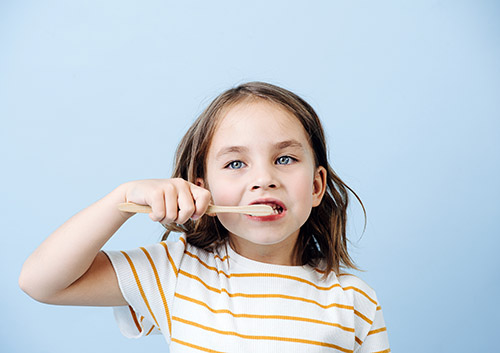
We’ve all learned a lot about staying healthy lately. As a parent, you give good advice about avoiding germs in public places, cleaning things that get touched a lot like phones and keyboards, and learning the best way to wash hands. These small daily habits can have a big effect on your child’s health.
And since you’re already taking care of your little one by making sure they brush at least twice a day, we have some good advice for small habits which can make their toothbrush even cleaner and brushing even healthier.
Brushing Habits
Don’t let germs hitch a ride on your child’s toothbrush before they even begin brushing! Make sure their hands are clean before they start, and rinse off the toothbrush before they put it in their mouth.
After brushing, be sure your child rinses their brush carefully to get rid of leftover toothpaste and bits of food. Also, clean the toothbrush holder regularly to get rid of germs and bacteria.
And while we’re talking about germs, how about . . .
- Flushing Habits
Most toothbrushes live in the bathroom, where we also find—the toilet. Every time we flush, invisible bacteria and particles fly through the air. And while that might not make you sick, it’s still pretty gross. Closing the lid before you flush helps keep your family’s toothbrushes—and bathroom—cleaner.
- Airing? Yes!
Keeping a toothbrush in a dark, wet environment is the perfect way to help bacteria grow. Instead of putting a wet toothbrush in a case, let it air dry standing heads up after use. Give it a shake first for a head start on drying out.
- Sharing? No
We’re not talking about sharing a brush, which you would never do. We’re talking about sharing space. If your child’s brush touches other brushes in a toothbrush holder, it’s probably sharing germs. Toothbrushes shouldn’t be too close to other toothbrushes, no matter how close you are to the other brush’s owner!
Finally, no matter how well your child takes care of their toothbrush, there comes a time when you should let it go. After three or four months, bristles become frayed and worn out. This means the brush won’t remove plaque as well as it used to. And to be on the safe side, it’s a good idea to replace a brush if your child has been sick.
Keeping your child’s teeth and mouth healthy is one very important way to keep their whole body heathy and happy. Talk to Dr. T.P. Sivakumar, Dr. Savithri Sivakumar, Dr. Emily Little, Dr. Kevin Banks, Dr. Sruthi Paimagham, Dr. Sagar Patel, Dr. Nikki Fischbach and Dr. Wendy Daulat at our Frederick office to learn more about simple habits for healthy teeth!
